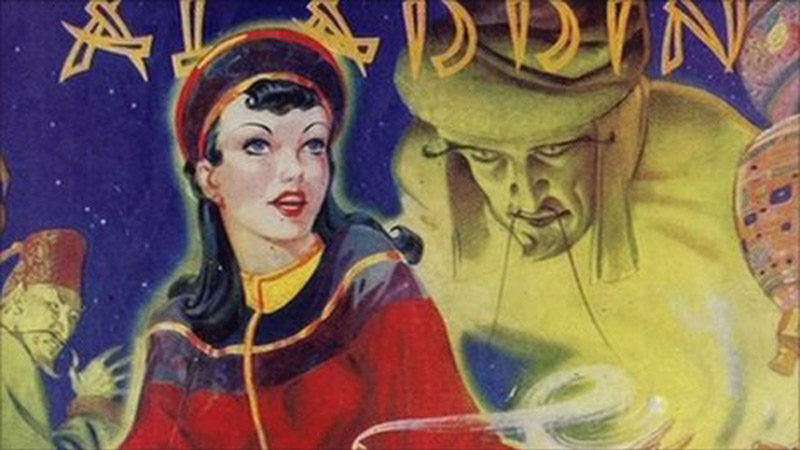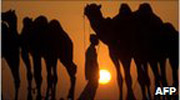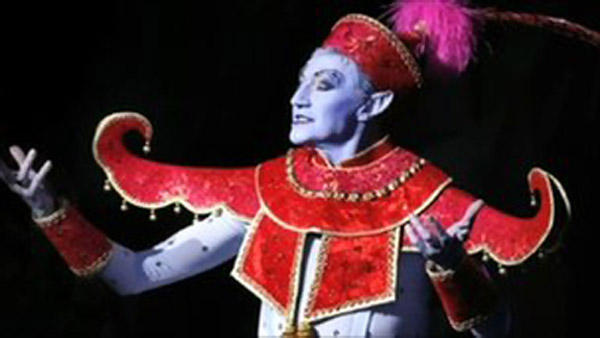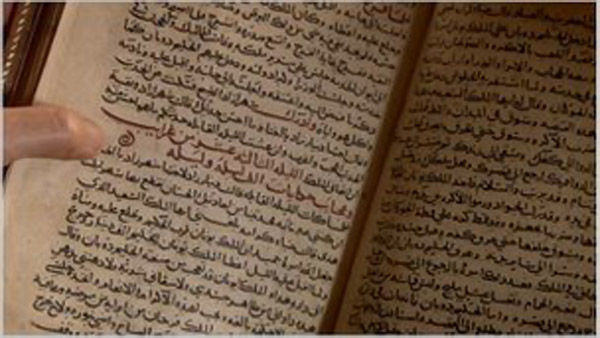Richard E. Grant Unravels Origins Of The Arabian Nights
BBC News – 20th April, 2011

The Arabian Nights introduced readers the world over to a bewitching world of magic, genies, evil spirits and iconic heroes. Actor Richard E Grant investigates their origins and examines their enduring appeal.
The Arabian Nights story that most transfixed me as a boy was Ali Baba and The 40 Thieves.
It appealed because there were caves near the house where I grew up in Swaziland, so a story that featured a cave full of hidden treasure, that could be “opened and closed” with the magic words “Open Sesame” seemed more immediate than other fairy stories I had read.
Its horror content, specifically Aladdin’s brother Cassim who forgot the magic words to get out of the cave – resulting in him being murdered by the returning thieves and his body being cut up into pieces – was monstrously pleasing and terrifying to me at that age.
It was also a good bogey-man image to conjure up when my father warned me about what would happen if I stole anything.
The story of the old tailor Baba Mustafa secretly sewing Cassim’s body back together again for his funeral has haunted me ever since.
As has the servant girl Morgiana outwitting the villains by pouring hot oil over their heads while hidden in oil jars.
It was surprising to discover during the making of a documentary for the BBC, that the veracity of Ali Baba has been questioned.
 “The elements can conjure up sand or wind storms in an instant… these acts of nature could be… interpreted as the actions of Djinns (genies)” — Richard E Grant |
When Antoine Galland, the much-feted French Orientalist translator of the Arabian Nights, charmed Parisian society in the 18th Century with his translation, Ali Baba was one of the most popular tales.
Antoine Galland claimed that he had heard the tale from a Middle Eastern storyteller from Aleppo, Syria.
Other academics have claimed that Galland invented the story, although the celebrated explorer and Orientalist Sir Richard Burton also confirmed that the story was part of the original Arabic manuscript (see box).
Galland’s original manuscript is a small black book, kept under lock and key at the National Library in Paris.
The proprietorial curator wore surgical gloves to handle the book.
Unlike 18th Century English, it was easily readable in French, which does not seem to have changed much in the past three centuries.
She explained that there was academic controversy about the provenance of Ali Baba, but that whether it was an invention of Galland or not, it fitted within the canon of the tales.
Trying to pin down the origin of stories that have passed down orally is akin to juggling with water.
The tradition of oral storytelling and embellishment down the centuries makes perfect sense when you consider that tribes of nomadic people travelled across North Africa to the Middle East and beyond to India, putting storytelling centre stage around camp fires in the evenings.

Conservatives in Egypt tried to have the tales banned for being anti-Islamic
Anyone who has ever played that game where one person whispers the beginning of a story into someone else’s ear and they then have to repeat and add to it, will know how a story evolves and expands very quickly.
Likewise, the oral tradition of repeating the stories that make up The Arabian Nights, told by different people over a period of 10 centuries, will be hugely variable.
Many stories involve poor people defying tyrants, genies, evil spirits and adverse physical conditions to win the hearts of their true love or monetary riches.
Spending any time in the Sahara desert makes it clear how the elements can conjure up sand or wind storms in an instant, and it does not take rocket science to work out how these acts of nature could be re-configured or interpreted as the actions of Djinns (genies).
Two years ago, religious conservatives in Egypt attempted to ban The Arabian Nights on the grounds that they were too sexually permissive and anti-Islamic.
Prompting public outcry and fierce opposition, especially from academics, the ban was overruled.
The Egyptian Attorney General ruled it was one of humanity’s greatest treasures.
The more violent and sexual aspects of the stories were watered down in Galland’s translation, and the panto versions we are so familiar with from childhood are testimony to this self-censorship.
However, the mixture of exotic locations, paupers and tyrants, magic and malarkey has proved to be a potent combination and accounts for the Nights’ continuing popularity.
Word Of Mouth

The tales have their roots in oral storytelling thousands of years ago including folk tales from India and mystical stories from Persia.
They were carried and spread by traders travelling on the great trade routes of the East where they began to take shape.
The oral stories were collected and written down in the great cities of Baghdad, Damascus and Cairo.
In the 10th Century, an Arab historian recorded the tales and called them A Thousand Nights.
The earliest manuscript of the tales is in Arabic and was written in Syria in the 14th Century.
French traveller and scholar Antoine Galland translated it from Arabic in to French in the 1600s.
He began with Sinbad the Sailor, which was an immediate sensation in Parisian high society.
After fans stood outside his house and demanded more, he is believed to have written more stories and embellished others, such as Ali Baba and Aladdin.
In 1706 an anonymous translation of Galland’s book called The Arabian Nights arrived in Britain.
Records show the first theatrical performance of Aladdin was held in 1788 in London’s Covent Garden.
Secrets of The Arabian Nights is on BBC Four 21 April 2100 BST.
Images Copyright BBC/Media Fire.
To see clips from the show, click here.




